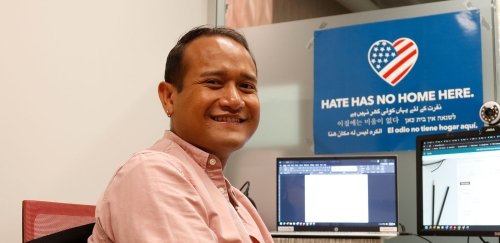Dispelling the Myth of the Asian American Model Minority
- News & Events
- News
- Dispelling the Myth of the Asian American Model Minority

“The problem with stereotypes is not that they're untrue, it’s that they’re incomplete. They make one story become the only story.” – Chimamanda Ngozi Adichie
Asian Americans are commonly stereotyped as ‘model minorities’ for their educational attainment (exceeding even White Americans) and above-average household incomes.
“What people don’t realize is that Asian Americans are not a monolith,” says Cambodian American Anthony Mam. “Different subgroups have different experiences.”
Although some East Asian groups (Chinese, Japanese, Koreans) have indeed excelled educationally and economically in America, Southeast Asian Americans (Cambodians, Hmongs, Laotians and Vietnamese) have not.
A 2020 report by “Southeast Asian American Journeys” revealed that all Southeast Asian groups have lower than average per capita income and that Hmong Americans comprise the highest poverty bracket in the United States across all racial groups.
Mam is a college success coach for Onward We Learn (formerly College Crusade) housed at Rhode Island College. With a case load of 230 students at RIC, Mam is determined to help these students complete their degree. Designed for low-income, first-generation college-bound students, Onward We Learn enrolls more Southeast Asian students than East Asian students, Mam says.
Unlike East Asians, Southeast Asians arrived in America as refugees from the Khmer Rouge regime, the Vietnam War and the U.S. “Secret War” in Laos. It was the largest mass resettlement of refugees in American history.
They came to America with nothing and were placed in low-income Black and Latinx communities, where they faced the same poverty, the same poorly funded schools, the same racialized and criminalized profiling and the same lack of economic mobility as their Black and Brown counterparts. Thus, the very real struggle for socioeconomic attainment among Southeast Asians has been masked by the model minority myth.
“We face discrimination on different fronts even within the Asian community,” Mam says. “The lightness or darkness of our skin is associated with socioeconomic status in Asian countries. It’s assumed that people with dark skin, like Southeast Asians, are farm workers.”
And where East Asians have excelled educationally, Southeast Asians have not attained the same level of success. Nearly 30 percent of Southeast Asian Americans have not completed high school or passed the GED, a rate more than double the national average (13 percent).
And in higher education, only 25 percent of Southeast Asian Americans hold a bachelor’s degree or higher, compared to 50 percent of Asian Americans who do (“Southeast Asian American Journeys,” 2020).
“Because our families struggle economically, parents don’t pressure their children to go to college,” Mam explains. “They want a better life for their children, but they also need their children to work to help support the family. You’ll see students working part time to help out with the family business, studying at the counter of their family’s restaurant, trying to balance work and school. Often, they end up dropping out of school.”
Lack of support and low expectations from teachers and guidance counselors can be barriers, as well, to economic and educational advancement.
“I had a guidance counselor tell me that I couldn’t apply to a top-tier school like Harvard because she didn’t think I could get in, even though I was an honors student,” Mam says.
Though he was eventually awarded a full-tuition scholarship to Bryant University and completed his graduate work at the University of Rhode Island, Mam says, “I chose this profession as a college success coach so that I could be the support system for students I wish I had.”
Onward We Learn begins working with college-bound students as early as sixth grade. Mam advocated to have the organization’s pamphlets translated into Southeast Asian languages. He particularly urges Asian American students not to succumb to the pressure of living up to the model minority image. “My hope is that they become independent thinkers, free from the expectations of family and society,” he says.
Anthony Mam's office is located in the Learning for Life office at Rhode Island College. Email him at amam@onwardwelearn.org or call 401-400-0051.
